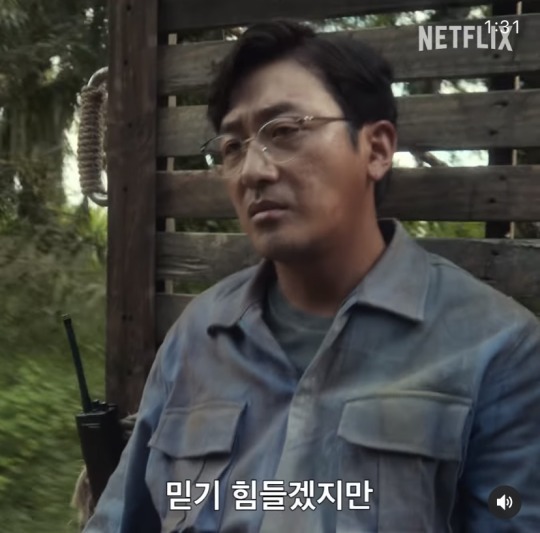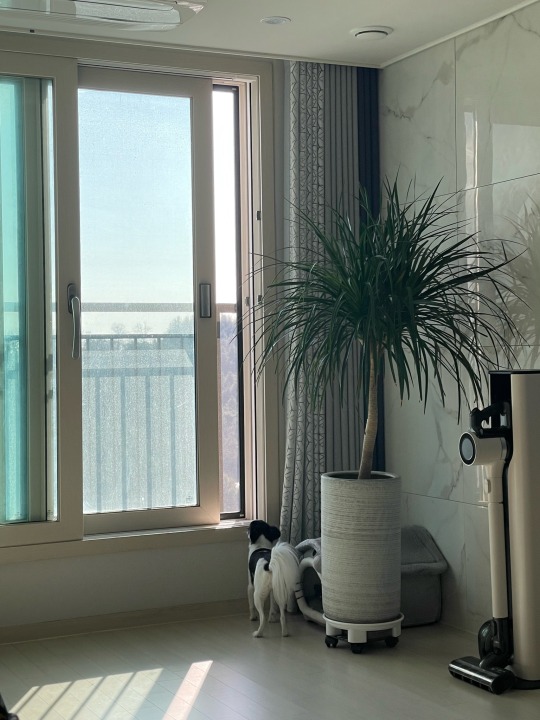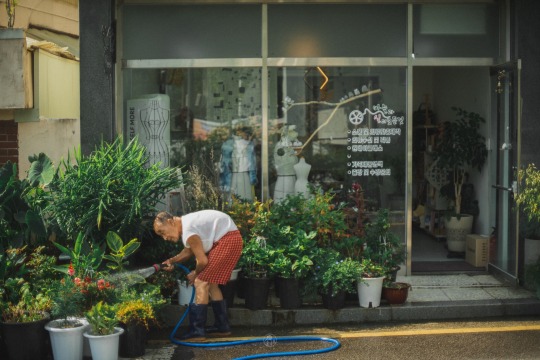#-겠다
Text
V/A STEM겠다
[...·gett·da]
(conjugable suffix) (1st person)
(formal) (declarative future) (highest level of certainty) (strong intention or will, not just a plan which can be cancelled any time for any reason, promise, commitment) I will V and I intend to
(declarative present) (assumptions about someone else's situation · supposition, guess, bet, thought, observation, speaker's subjective opinion · trying to be polite while unsure about something) I think/bet/guess ... V/A ..., to look/it looks ... V/A ..., (it) must be ... V/A ...
(combined with 알다 and 모르다 to raise the politeness)
(2nd person) (interrogative future)
will / would you V?
Using 겠 increases the politeness level of the sentence, thus it is more likely to be used in formal situations.
#겠다#gettda#grammar: intentions#theme: modal verbs#grammar: suppositions#will#I will#think#bet#guess#it looks#looks#it must be#to look#look#must be#must#겠#gett#intend#would
0 notes
Text
One-Page Masterlist
안녕하세요! Hey everyone! I recently got an ask about my old masterlist, which is the same as my broken-down masterlist except it has all of my lessons on one page, rather than on multiple separate posts. Some may find this expanded version easier to navigate, so I’ll keep this up for y’all! My broken-up masterlist, of course, will still be available for those who find that more helpful :)
Hangul Lessons
Consonants
Vowels
Writing/Reading Korean Syllables
Some 받침 Rules
Diphthongs
Stroke Order
Some More 받침 Rules
Irregular Verbs
The Basics
Common Phrases
Numbers
Sino-Korean vs. Native Korean Numbers (Instagram Post)
Sentence Structure and Particles
Present-Tense Conjugations and Formal Language
Adjectives
Questions
Honorifics and Casual Language
Beginner
Negative Sentences
잘 and 못
Past Tense
Future Tense (-ㄹ / 을 것이다)
-ㄹ / 을 까요? (Shall we…? / I wonder…?)
-(으)세요 (Giving Commands / Asking Questions)
Telling Time
-고 싶다 (I want to…)
How to Say “And”
-지만 (However)
아/어/여서 (So…)
Negative Commands
Spacing (띄어쓰기)
Adverbs
ㅂ Irregular
Comparatives and Superlatives
난, 날, & 내가
Upper-Beginner
-(으)면 (If…)
아/어/여도 (Even though…/Even if…)
(으)면 되다 / 아/어/여도 되다 (I can…/You may…)
-아/어도 되다: Asking for and Giving Permission (Instagram post)
-(으)면 되다 & -(으)면 안 되다 (Instagram post)
아/어/여야 되다 and 아/어/여야 하다(Have to / Should)
Present Progressive (-고 있다)
How to Say “Or”
-아/어/여하다
All About 중
How to Use -(으)로
Before & After
-ㄴ/은 채로
Intermediate
Describing Nouns with Verbs (-는 것)
Describing Nouns with Verbs - Past & Future Tense (-ㄴ/은 / -ㄹ/을 것)
Nominalization
것 같다 (I think… / It seems…)
-러 가다 / -러 오다
-(으)려고 (In order to…)
-기로 하다 (to Decide to do Smth)
척하다 (To Pretend)
-게 되다
-군요 / -구나
아/어/여 보다 (to try…)
-은/ㄴ 적 있다 / 없다 (I have / have not)
-ㄹ/을 게요 (Future Tense)
겠다
-ㄹ/을 수 있다/없다 (I can / cannot)
-ㄹ/을 때 (When…)
-ㄴ/는다면 (If)
-(으)면서 and -(으)며
-(으)니까 (Because / So)
-아/어/여주다
-(ㄴ/는)다 (Narrative Form)
Quoting
Let’s…
Quoting continued
(으)ㄹ래요? (Wanna…?)
-죠
-대로
More Quoting - 대 & 래
잘하다 & 못하다 vs. 잘 하다 & 못 하다
-아/어 가지고
-(으)려면
-는 길에 & -는 길이다
-(으)면 vs. -ㄴ/는다면 (Instagram Post)
-았/었을 것이다
-느라고
-는 데(에)
-ㄹ/을 뻔하다
Upper-Intermediate
-ㄴ/는데
-(으)ㄴ/는지 (Whether or not)
-(이)라는…
All About 아무리
-잖아요
Expressing Surprise
-시 (Honorific)
Making Comparisons
-아/어/여지다
I might…
So that…/To the point where…
Causative Verbs
시키다
Passive Verbs (part 1)
Passive Verbs (part 2)
-ㄴ/은가 보다 & -나 보다 (I guess…)
-ㄹ/을수록
Other Meanings of 싶다
-자마자 & -는 대로(As soon as…)
-긴 하다
-치고
-김에
차라리 (Rather)
-(으)ㅁ Nominalization
-기는 무슨 & -기는 개뿔
-고 보니까
-듯(이)
버리다
-(으)면 좋겠다 & -(으)면 하다
-길 바라다
Advanced
-거든(요)
-줄 알다/모르다
-ㄹ/을 테니까 and -ㄹ/을 텐데
-았/었던
아니라 and 대신에
-ㄹ/을 리가 없다
편이다, 별로, and More
-지 그렇다 (Why don’t you…?)
-ㄹ/을 걸
-ㄹ/을 까 보다
-다면서요
-다니 part 1
-다니 part 2
뜻이다 & 말이다
-다가
-더라고(요)
-더니
Some colloquialisms: 아니시에이팅 and 뭐 이렇게
-(으)ㅁ Sentence Ending
-다 보니까
What does 따위 mean?
-ㄴ/는데도
Korean Idioms
Vocabulary
Must-Know People
Must-Know Places
Must-Know Things
Must-Know Verbs
Must-Know Adjectives
Countries
Months, Days of the Week, and More
Clothing (옷)
School (학교)
Autumn (가을)
Autumn (w/Pictures!)
More Questions
House / Apartment (집 / 아파트)
Emotions / Feelings ( 감정)
Animals (동물)
Loan / Konglish Words
Food and Drink (먹을 것과 마실 것)
Parts of the Body (몸)
Counters
Modes of Transportation (교통 수단)
Colors (색깔)
Colors (with Pictures!)
Weather (날씨)
Winter (겨울)
Music & Instruments (음악과 악기)
Baking Gingerbread Cookies
Emergency (비상)
Hygiene & Bathroom (위생 & 화장실)
Indefinite Pronouns
Work / Office (일 / 사무실)
Spring (봄)
Coronavirus Prevention (코로나바이러스 방역)
How to Wash Your Hands (손을 씻기)
Time (시간)
Korean Cuisine (한식)
Summer (여름)
Summer (여름) w/Pictures!
Graduation (졸업)
Identity (독자성)
Korean Text Slang
Similar Words
Makeup w/Pictures! (화장품)
Family (with Pictures!)
Pronouns
How to Say “Still” and “Already” in Korean
Tastes & Textures (맛과 질감)
K-Pop Audition
K-Pop Fandom Terminology
Different Ways to Say “Change”
Flower Names
What Does 원래 Mean?
What does 오히려 Mean?
College
Hanja Lessons
최
수
악
식
급
동
부 & 불
애
출
퇴
예
음
중
학
습
연
생
대
입
인
문
감
과
원
특
만
후
무
Charts
Present, Past, and Future Tense
Question Words
잘 vs. 못 and Negative Conjugations
Future Tenses
-았/었던 vs. -던 (at end of lesson)
Particles
Some 받침 Rules
Gifving Commands
Conjunctions and -아/어/여서 vs. -(으)니까
-(으)면 vs. -다/라면 and Different Ways to Say “And”
How to Say “Or” (at end of lesson)
Telling Time (at end of lesson)
Comparatives and Superlatives
잘하다 & 못하다 vs. 잘 하다 & 못 하다 (at end of lesson)
Comparing 잘하다/못하다, 잘 하다/못 하다, & 수 있다/수 없다
Irregular Verbs
Pop Quizzes
Level 1
K-Pop Breakdowns
TXT - “Cat & Dog”
Twice - “Feel Special”
Enhypen - “Fever”
2NE1 - “Go Away”
Lee Hi - “Only”
“기억을 걷는 시간 (Time Spent Walking Through Memories)”
KCM - “An Old Love Story (흑백사진)”
Taeyeon - “Can’t Control Myself”
Epik High - “Lost One”
Colde - “A Song Nobody Knows”
IU - “My Sea”
Enhypen - “Polaroid Love”
유라 (youra) - “하양 (RAL 9002)″
BTS - “Ddaeng”
Stray Kids - “For You”
Woozie - “어떤 미래 (What Kind of Future)
TXT - “Eternally”
LOONA - “Heart Attack”
Stray Kids - “Muddy Water”
LOONA - “Girl Front”
Pentagon - “Daisy”
BTS - “Sea”
Semester in SK
Nami Island (남이섬)
Things to Buy at Daiso
Shopping Phrases
Ordering Coffee
Signs in Korea
Ordering at a Restaurant
Riding the Seoul Subway
Things at the 편의점
Korean Curse Words
Etiquette in South Korea
Drinking Culture
Hanja in Real Life
Holidays in South Korea
Korean Cuisine
Concert Ticketing in South Korea
K-pop Comebacks in Korea
Summer in South Korea
What I Learned
#korean#korean language#hangul#korean grammar#korean vocab#korean vocabulary#learn korean#learning korean#langblr#Korean langblr#masterlist#apok#apopofkorean#study korean#studying korean#kpop#kpop lyrics#basic korean#beginner korean#intermediate korean#advanced korean#hanja#한국어#한글#한자#한국어 공부하기#한국어 배우기#한국어 문법#한국어 어휘#초급 한국어
2K notes
·
View notes
Text
MASTERLIST
(Korean-Learning Content)
Here Is A List Of Most Of The Content I Have Made So Far. (you can only add 100 links per post, so I have to make a second part I guess🤡. I'll link to it in this post whenever I finish doing that.)
Note: these are in no particular order. It's kind of all over the place, but it should still help you out😂
Beginner Topics
1. Seasons in Korean
2. Months In Korean
3. Vowels Hangul Short Quiz
4. Beginners Vocab Short Quiz
5. Days Of The Week
6. Tell Date In Korean
7. What's Next After Learning Hangul?
Korean Grammar
아니요 vs 아니에요 vs 아니라
는데, 은데, 인데 Lesson | All Usages
Masterlist Of Beginner Korean Grammar
좋다 vs 좋아하다
기 때문에 & 아/어/해서 & (으)니까
-안 vs -지 않다
How To Say "IF" In Korean
How To Ask Questions In Korean
(으)러 가다, (으)려고 하다, 기로 하다 Lesson
(으)ㄴ지 Lesson
Korean Dialogues & Conversations
1. Mini-Korean Conversation | Topic : Coffee | #1
2. Intermediate Korean Convo | Topic : Amusement Park | #2
3. Korean Conversation - Grammar-Focused | Topic : Haircut | #3
4. Low-Intermediate Korean Convo | Topic : Meeting For The First Time | #4
5. Grammar-Focused (ㄹ때, 지 말라고, & 어/아야 겠다) | Topic: Kids On Their Phones | #5
6. Beginner Korean Conversation + Lots Of Beginner Grammar Covered | Topic : Deciding Where To Eat | #6
7. Beginner Korean Conversation | Topic : Drawing
8. Korean Convo | Topic : Karaoke | #8
9. Intermediate Korean Dialogue | Topic : School-Related | #9
10. Beginner Korean Dialogue | Topic: Birthday presents
11. Short Beginner Dialogue | Topic : meet up
12. Beginner Korean Conversation | Topic : Taking Pictures
13. Intermediate Korean Dialogue | Topic : The Best Way to Make Ramen
14. On The Phone With My Girlfriend
15. Sending A Text To The Wrong Person
Reading Practices & Stories
Reading Comprehension Test | Topic: small talk
Story About Friend Moving Away
Listening Practice
Beginner Listening Practice #1
Korean Listening Practice #2
Korean Listening Practice #3
Vocabulary Lists
1. Jobs & Occupations List In Korean
2. School Vocabulary
3. Korean Homonyms | Part 1
4. Night-Themed Vocabulary List
5. Korean Homonyms | Part 2
6. Word Of The Day ~ 거북이
7. Mini-Vocabulary List - Weather
8. Common Korean Verbs > Short Video
9. Mini-Vocabulary List - Nature
10. Language Learning Vocabulary
11. Korean Homonyms | Part 3
12. Word Of The Day ~ 불
13. Word Of The Day ~ 약간
14. Health & Medical Terms
15. List Of Adverbs
House Vocabulary
16. Commonly Confused Korean Words 1
17. Commonly Confused Korean Words 2
18. Commonly Confused Korean Words 3
19. Korean Fruit Names
20. Korean Homonyms
21. Flower Vocabulary Words
22. Korean Love Words | words & phrases w/ 사랑
23. 지금 vs 이제
24. 알아듣다 vs 이해하다
25. Korean Synonyms
26. Korean Filler Words
27. Korean & Japanese Words
28. Korean & Japanese Words (part 2)
29. Hair Vocabulary
30. Shapes In Korean
31. Korean ROOT Words
Korean Numbers
1. How To Count From 1 to 1000 using Sino-Korean Numbers
2. The Difference Between Sino & Native Korean Numbers
3. Korean Numbers Quiz > 1 to 100
4. Korean Numbers Quiz > 100 to 1000
Idioms & Phrases
1. Korean Proverbs
2. 김새다 = Ruin The Fun | Idiomatic Expression #1
3. 어쩔 수 없다 = It Can't Be Helped | #2
4. How To Say Ignorance Is Bliss | #3
5. 쓸모가 없다 = It's Useless | #4
6. 기가 막히다 ~ "to be at a loss for words" | #5
7. 기가 죽다 ~ lose confidence/less energy and feel depressed | #6
8. How To Say I Don't Care | #7
9. 말도 안돼요
10. Motivational Korean Quotes
11. Idioms That Are Too Relatable
12. Korean Break-Up Lines & Quotes
13. Funny Korean Expressions
14. Non-Basic Korean Phrases
Tongue Twisters
1. Mokdong Royal | Short Tongue Twister | #1
2. 경찰청 ~ Police Headquarters | #2
3. Longest Korean Tongue Twister + Breakdown | #3
4. 3 Short & Fun Korean Tongue Twisters
5. Short Korean Tongue Twister: Moon
6. Giraffe Tongue Twister
Korean Culture
1. List Of Korean Holidays
2. Difference Between North & South Korea
3. Tropes Seen In Kdramas
Interesting Random Topics
1. 3 Ways To Say 'Heart' In Korean
2. Korean Text Slang
3. Korean Combination Words
4. Korean Study Materials
#한국어#korean langblr#korean language#korean lesson#study korean#koreanmasterlist#masterlist#한국어 공부#learning korean
996 notes
·
View notes
Photo

대한민국에서 보고 계시는 국민 여러분과 친구, 가족, 그리고 소중한 팬들과 기쁨을 나누겠습니다. 감사합니다. I want to share this joy with the people, friends, family, and precious fans watching at home in Korea. Thank you so much.
• 대한민국 Republic of Korea, Korea
• -에서 at, from
• 보다 to see, to watch
• -고 게시다 (-고 있다) formal version of present progressive, to be doing something
• -(으)ㄴ/는/(으)ㄹ changes verb into adjective (past, present, and future tense)
• 국민 people, citizen, national
• 여러분 everyone
• -와/과 and, with
• 친구 friend(s)
• 가족 family
• 그리고 and
• 소중하다 precious, valuable
• 팬 fan
• -들 plural marking particle
• 기쁘다 happy, glad, joyful
• -(으)ㅁ changes verb into noun
• -을/를 object marking particle
• 나누다 share, divide, split
• -겠다 expresses speaker’s intention, increases politeness of phrase
• 감사합니다 (감사하다 thankful, grateful) thank you very/so much
57 notes
·
View notes
Text
새해 인사를 돌려 카톡 리스트 아래 있던 사람들을 다 위로 올렸다. 그 중 한 사람이 통화하자고 해서 오랜만에 목소리를 들었는데 그래서 우린 언제보냐 하길래 지금 볼까? 했더니 웃으며 최근 로마에 여행다녀온 이야기를 꺼냈다. 비행기 기체결함으로 하루 늦었는데 결과적으로 여행경비를 거의 모두 보상받았다는 얘기. 좋았겠다 맞장구 치며 앞으로 통화하자는 말엔 쉽게 통화하지 않아야 겠다 생각했다.
이틀 동안 직장내 있었던 일에 열받아 혼자 씩씩 거리고 있었다. 다들 내 편이야. 그래봐야 사회부적응자가 혼자 급발진한 것 뿐이라고 생각을 하고 또 해도 너무 이상적으로 마무리를 한 탓인지 그러니까 내 속맘 그러니까 개빡침에 기인한 답글을 쓰지 않은 탓인지 속이 부글부글 멈추질 않았다. 그래서 더 속이 타고 찢어지게 아플 일을 만들었다. 미안하지만 내 희생양이 되어줘. 넌 그래도 지금 누구보다 행복하고 누구보다 안정적인 장소와 시간에 있잖아. 날 버려두고.
23년 첫 날, 그동안 끊었던 곳에 가야할 지도 모르겠구나 생각이 들었다. 악몽을 꿨으면 좋겠어. 이 모든 현실이 그나마도 다행일 정도의 그런 악몽. 22년 12월 23일에 꿨던 그런 악몽.
31 notes
·
View notes
Text
이제는 좀 혼자 있는 방법을 탐색해야겠다. 지겹도록 긴 여정이겠다. 얄팍한 안정감 같은 거 이제 의존하지 말아야 겠다. 나의 모든 신경을 쏟을 곳이 타인이 아니길 바란다. 이게 다 당신 때문이야 탓하기도 지친다.
10 notes
·
View notes
Text
"회고"
*** 이번 주부터 새로운 멤버 인이님과 함께합니다!
*회고
돌아보면 그리운 생각뿐이다.
후회도 그리움도
다 녹아버릴 아득함이다.
먼 옛날일 같으면서도
막상 세어보면
엊그제 같다.
그리움은 그런
야속함을 먹고 자라나보다.
네가 곁에 없을수록,
자꾸 널 그리게 된다.
돌아보게 된다.
돌아오지 않을 일들이란 것을
알면서도.
견뎌내지 못할 과거임을 알면서도.
지독히도 아픈 사람.
-Ram
*회고
힘든 순간을 보내고 있을 때 떠올려 미소 짓게 만드는 순간들이 많아졌으면 좋겠다. 비록 뜨겁게 내리쬐는 태양 아래라도 양산 밑에 숨어 아무도 알지 못하게 웃을 수 있게. 어느 누구도 알아보지 못하는 도시에서 문득 낯선 외로움을 느끼더라도 나의 지난날들이 뭉쳐 단단한 뿌리가 되어 자신을 다 잡을 수 있게. 이미 지금으로부터 지난 무수한 순간들은 너무 많이 꺼냈다 넣어다 반복하다 보니 해어지지 않은 것들이 필요하다.
-Hee
*회고
여름 감기가 독하다더니 온몸을 두들겨 맞은 것 같은 통증과 고열에 며칠 사경을 헤맸다. 해롱거리는 모습이 퍽 안쓰러웠던지 지영이 나를 돌본다. 자주 없던 일이라 묘하게 좋은 기분이 들었다. 열을 약기운으로 누르고 나와 걷는 여름밤이 선선하다. 전국 곳곳에 축제가 열리고 술집마다 웃는 사람들로 가득하다. 호시절이다.
좋은 기분과 좋은 계절이 같이 흐를 때면 작년 이맘때 뭘 하며 지냈었나 궁금해진다. 찾아보니 작년에는 지영과 만리재를 산책한 뒤 화이트 와인을 마셨고, 재작년에는 영덕 블루로드를 걸었다. 사진을 뒤적이며 나누는 시시콜콜한 이야기들. 사소한 근심들 위를 떠다니다 오랜만에 만난 행복이다. 대단치 않으나 틀림없는 행복.
-Ho
*회고 - 회고와 회상의 차이
나는 회고보다는 회상을 하는 것이 더 어울린다.
회고는 공적으로 회상은 사적으로 기억을 더듬는 것이라 한다.
내가 나중에 유명해지고 나면 회고를 해볼 수 있을까?
내가 걸어온 길이 스토리가 되어 누군가에게 영감을 줄 수 있을까?
많고 많은 정보와 활자가 쏟아지는 시대에 나까지 보태고 싶지 않아 많은 생각을 머리속으로만 했었다.
세상에 나와야만 정리가 되는 말들이 있다.
당장의 회고가 아니더라도, 앞으로 나의 회고를 위해 차곡 차곡 쌓아가는 연습을 해야 겠다.
-인이
11 notes
·
View notes
Text
Conjugation in English
There are 3 basic ways to conjugate words in English and for this example i am going to use draw as the verb and I as the subject
There is the basic “I draw” sub+verb
Then there is present tense “I am drawing”
Then there is future tense “ I will draw”
Then past tense “I drew” or “I have drawn”
The reason I have this is so I can add on to it the languages I’ve learned and apply when wanting to apply
Korean honorifics
Low informal 어/아
High informal 요+low inf.
High formal 습니다
Korean conjugation
Present tense- 는다
Past tense-었다/ 았다
Future tense- 겠다
7 notes
·
View notes
Note
What does the phrase "겠냐고?" mean?
Hello! So sorry for the wait. This grammar has two parts: -겠다 and -냐고. In short, -겠다 is a kind of future tense, -냐 is an informal way of asking a question, and -냐 combined with -고 is a way of quoting a question. That’s all I’m going to get into for those grammar points for now, but if you’re interested, check out my full-length lessons on them linked!
Let’s see an example with only -냐 from hinative:
이게 되냐? = Will this work?
Now if you add -고 to the end of that, it becomes
이게 되냐고? = He/She/They/You asked if it would work?
Literally, this is quoting what another person said. From what I read on hinative, however, -겠냐고 has a more aggressive nuance and is used to ask something like, “did you really think that would work?” Or “did you just ask me if that would work?” Something like that. I’m not a native speaker so I can’t tell you the nuance for sure, but I hope this is kinda helpful at least! If anyone else has any better explanation, please share! Thanks so much for your patience! 화이팅!
38 notes
·
View notes
Text

How To Ask Questions In Korean
We’ll go over the most basic and easiest way to do it and then the most confusing, which is actually using the question words to form your own question. You should be familar with sentence structure first to understand this well. I have another post on it here.
The first way is to simply turn a normal sentence into a question by raising your intonation at the end of it. Like when you ask a question in English your voice goes up a little at the end of the sentence.
하교에 가요. (I am going to school.)
학교에 가요? (Are you going to school?)
The sentence doesn’t change, but the way you read it does. You can try it by reading these out loud or in your head above.
The Question Endings:
~ 입니까? / 습니까?
~니?
~ 나요?
The next way to ask questions is to simply attach one of these.
The formal high respect ~습니다 is never used as a question. When asking a question in this form, instead of using ~습니다 you must use ~ㅂ/습니까. ~ㅂ니까 gets added directly to stems ending in a vowel, and ~습니까 gets added after a stem ending in a consonant. You can do this with all tenses.
Past Tense: 았/었/했습니까
Present Tense: 았/었습니까 / 합니까
Future Tense: 겠습니까 | ㄹ 것입니까 / ㄹ 겁니까
When asking a question, instead of ending your sentences with ~아/어, you can end them with ~니. This is an informal way to ask a question, and you can do this in all tenses.
For example:
Past tense: 했니, 먹었니, 갔니, 이었니
Present tense: 하니, 먹니, 가니, 이니
Future tense (~겠): 하겠니, 먹겠니, 가겠니
Future tense (~ㄹ 것이다): 할 거니, 할 것이니, 먹을 거니, 먹을 것이니
You can use ~나(요) at the end of a sentence to ask a question also. It can be used to make a question sound slightly softer than the other ways to ask a question. However, ~나(요) is more often used with verbs and with 있다 and 없다.
It is possible to use this in the future tense, but it only sounds natural when applying it to the ~겠다 future conjugation. Adding ~나(요) to 이다 is typically not done, and therefore adding it to words that are conjugating using ~ㄹ/을 것이다 is unnatural.
Theres’s another ending i didn’t cover in this post : ㄴ가요? | It functions the same as -나요?
The most confusing one:
I’ll only cover the very basics in this post, but it can become more complex. Incase you don’t know the question words here is a list of basic Korean question words (What, when, where, who and why)
뭐 - what
언제 - when
어디 - where
누구 - who
왜 - why
어떻게 - how
Depending on which question word you are using, building a question can be really easy or really confusing.
Most question words are adverbs, which means it can be used/placed as an adverb in sentences. Adverbs can be used almost freely in sentences and technically do not have any specific location that they need to be used.
The most common position for these adverb-question words is before the verb. If there are other adverbs in the sentence (including the negative “안”) the question word is usually placed first. You may see these question words put at the end of a sentence as well. Remember the rule: before a verb - if you ever get overwhelmed.
Examples:
왜 늦었어요?
Why are you late?
한국에 언제 왔어요?
When did you come to Korea?
내 신발이 어디 있어요?
Where are my shoes?
오늘 오후에 뭐 할 거예요?
What are you going to do[your plans for] this afternoon?
어떻게 알았어요?
How did you find out?
In Korean, 누구 has the function of a pronoun. 누구 can be used in the place of a noun in a sentence – that is, it can be used to replace the object, the subject or as a noun before 이다.
This is the same in English – as you can see in the following three examples:
Who will study Korean tomorrow? – ‘who’ is the subject of the sentence.
Who will you meet tomorrow? – ‘who’ is the object of the sentence -“you” is the subject
Who is that person? = ‘who’ is ‘that person’ in the sentence
Examples:
누구를 만났어요? - who did you see/meet?
승규 씨가 누구입니까? - Who is Seung Kyu?
That's all for today's post. Check Out More Korean Lessons Here! Also check out my Spring Fling Challenge.
#한국어#korean langblr#korean language#korean lesson#questions in Korean#how to ask questions in Korean#Korean question words#질문#한국어 공부#korean vocabulary#한국어 단어#learning korean#korean grammar lesson#beginner korean
69 notes
·
View notes
Photo


믿기 힘들겠지만 it might be hard to believe but
• 믿다 believe, trust
• -기 changes verb into noun
• 힘들다 hard, difficult, tough
• -겠다 will do (be), probably do (be)
• -지만 but, even though
이 이야기는 전부 다 내가 직접 경험한 일들이다 this story is entirely my lived experience
• 이 this
• 이야기 story
• -은/는 topic marking particle
• 전부 all, everything
• 다 all, everything
• 나 me, I
• -이/가 subject marking particle
• 직접 in person, personally, directly
• 경험하다 experience
• -(으)ㄴ/는/(으)ㄹ changes verb into adjective (past, present, and future tense)
• 일 matter, affair
• -들 plural marking particle
• 이다 to be
59 notes
·
View notes
Text
오늘도 돈내고 바보가 되다.....저번과 다르게 딱히 재미가 없어서 왜인지 고민 좀 해야 겠다...
3 notes
·
View notes
Text
지난 토요일에 아내가 코로나 확진되었다. 드디어 우리 집에도 마수가 뻗쳤다. 토일월 3일간 아내는 완전히 뻗어버렸기에 병간호와 아이 뒤치닥거리까지 완전 힘든 미션을 수행해야 했다. 그 와중에 둘째도 코로나가 확진되었고, 오늘은 첫째가 코로나인거 같아서 검사를 해보니 음성이지만 어쨌든 열나서 약을 먹고 있고, 좀 전에 나 마저 열이 나서 타이레놀을 하나 먹었다. 다행이 아내가 조금 기운을 차려서 또 어찌저찌 굴러갈꺼 같다. 일단 굴러가기만 하면 되는거니까 호들갑 떨지말고 조바심 내지 말고 웃으며 굴려야 겠다.
한가지 의외로 불만족스러운건 코로나 걸렸다고 하니 양쪽 집에서 반찬을 잔뜩 해다가 주고 가셨는데, 뭐 감사하긴 하지만 아픈데 밥까지 차리고 그걸 치워야 되는게 일이란 걸 왜 이해를 못하는 것인지 조금은 이해가 안 간다. 내가 너무 내 입장에서만 이성적으로 생각하는 것인가?
근데 어차피 일반 감기약 먹는거라면, 오미크론인지 뭔지 변이 이후에는 이걸 이렇게 빡세게 공무원들을 갈아 넣어가면서 관리를 했어야만 하는 병이었는지 좀 갸웃거리게 된다. 타미플루 같은 치료제는 못 만드는 것인가 아님 굳이 만들 필요가 없어서 투자를 안 하는 것인가 그러고보니 셀트리온 회장님이라는 작자는 자기가 치료제 만들었다고 온 동네방네 자랑질하고 다니지 않았었나? 근데 이게 아무런 범죄행위가 아니라고? 참 이해하기 힘들고 이해할 수도 없는 세상이다. 그러니까 웃으며 굴러만 가길 바라자.

9 notes
·
View notes



